Monday, April 15th 2013

Intel Core "Haswell" Easier to Overclock
At the Intel Developer Forum (IDF) 2013 event held in Beijing last week, the company ran two separate seminars related to "Haswell," one related to the micro-architecture itself, and the other overclocking it. The company detailed improvements to the ways in which you can overclock these chips, without necessarily having to shell out dough for the base clock multiplier unlocked "-K" parts.
To begin with, tweaking Core "Haswell" processors will be similar to tweaking Core "Sandy Bridge-E" high-end desktop (HEDT) platform. Naturally then, overclocking "non-K" parts will be similar to overclocking the Core i7-3820. The chips ship with a base clock speed of 100 MHz. As with "Ivy Bridge," not just CPU cores, but also certain uncore components rely on this frequency. Also, as with "Ivy Bridge," overclockers will be given 5 to 7 percent headroom for tweaking this frequency, but it doesn't end there.As with Intel's HEDT platforms, not only will you be given up to 7 percent overclocking headroom to the 100 MHz default base clock, but also given the freedom to choose between three base clocks: 100 MHz, 125 MHz, and 166 MHz. The various other uncore frequency ratios will adjust themselves to compensate, and stability of these uncore components will remain unaffected.
At each of these base clocks, you will be given the same 5 to 7 percent overclocking headroom, so in theory, you could get a chip to run with a base clock of 173 MHz, while adjusting other ratios. The reason Intel cites you can't deviate from the 7 percent headroom, is that it could destabilize two important clock domains, PCI-Express and DMI-PLL. With unlocked "-K" chips, you get the freedom to step up base clock multiplier for the CPU cores all the way up to 80.0x for 100 MHz, up to 64.0x for 125 MHz, and up to 48.0x for 166 MHz; which if used right, could result in some awesome CPU clock speeds in the neighborhood of 8.00 GHz.
Clock speeds, multiplers, and ratios are only a part of the overclocking story, keeping them stable is the job of skillfully selecting the right voltages for the various power domains. With "Haswell," Intel is introducing integrated voltage regulation (iVR). Simply put, each processor comes with an integrated VRM controller, which ensures overclockers don't have to keep up with the ways in which VRM is implemented on different brands of motherboards. You'd still need a high-end motherboard with high-grade VRM components (chokes, capacitors, and FETs), yet the ways in which you tweak them will be more standardized. So just don't expect to be able to chase an 8.00 GHz record with a $60 motherboard.
The iVR design ensures that motherboards feed processors with just two power domains, vCCIN, and vDDQ. iVR takes input from vCCIN, and regulates it to vCORE (feeds CPU cores), vRING (feeds the ring-bus that interconnects everything on the processor), vSA/vIOA/vIOD (feed system agent or integrated-northbridge, and certain other uncore components), and vGT (feeds the integrated graphics processor). Ranges for these domains are detailed in the slide below.
To begin with, tweaking Core "Haswell" processors will be similar to tweaking Core "Sandy Bridge-E" high-end desktop (HEDT) platform. Naturally then, overclocking "non-K" parts will be similar to overclocking the Core i7-3820. The chips ship with a base clock speed of 100 MHz. As with "Ivy Bridge," not just CPU cores, but also certain uncore components rely on this frequency. Also, as with "Ivy Bridge," overclockers will be given 5 to 7 percent headroom for tweaking this frequency, but it doesn't end there.As with Intel's HEDT platforms, not only will you be given up to 7 percent overclocking headroom to the 100 MHz default base clock, but also given the freedom to choose between three base clocks: 100 MHz, 125 MHz, and 166 MHz. The various other uncore frequency ratios will adjust themselves to compensate, and stability of these uncore components will remain unaffected.
At each of these base clocks, you will be given the same 5 to 7 percent overclocking headroom, so in theory, you could get a chip to run with a base clock of 173 MHz, while adjusting other ratios. The reason Intel cites you can't deviate from the 7 percent headroom, is that it could destabilize two important clock domains, PCI-Express and DMI-PLL. With unlocked "-K" chips, you get the freedom to step up base clock multiplier for the CPU cores all the way up to 80.0x for 100 MHz, up to 64.0x for 125 MHz, and up to 48.0x for 166 MHz; which if used right, could result in some awesome CPU clock speeds in the neighborhood of 8.00 GHz.
Clock speeds, multiplers, and ratios are only a part of the overclocking story, keeping them stable is the job of skillfully selecting the right voltages for the various power domains. With "Haswell," Intel is introducing integrated voltage regulation (iVR). Simply put, each processor comes with an integrated VRM controller, which ensures overclockers don't have to keep up with the ways in which VRM is implemented on different brands of motherboards. You'd still need a high-end motherboard with high-grade VRM components (chokes, capacitors, and FETs), yet the ways in which you tweak them will be more standardized. So just don't expect to be able to chase an 8.00 GHz record with a $60 motherboard.
The iVR design ensures that motherboards feed processors with just two power domains, vCCIN, and vDDQ. iVR takes input from vCCIN, and regulates it to vCORE (feeds CPU cores), vRING (feeds the ring-bus that interconnects everything on the processor), vSA/vIOA/vIOD (feed system agent or integrated-northbridge, and certain other uncore components), and vGT (feeds the integrated graphics processor). Ranges for these domains are detailed in the slide below.
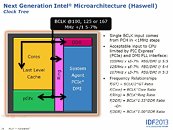
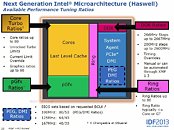
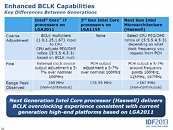
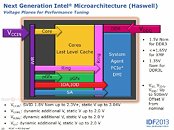
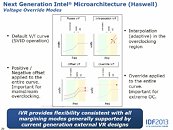
19 Comments on Intel Core "Haswell" Easier to Overclock
,but I wonder how the temp profiles will turn out when OC-ing i5s and i7s with the built in voltage regulator and that larger IGP? I’m kinda worried about the too much heat, to be honest.
Ps.: It’s great that Haswell is really going to be better than Ivy after all, but I think they need to give the staff back to the Haifa division for the next architecture again, or move some of the key „brain" guys from there to Oregon perhaps, because Sandy was the real deal, and they „just” slowly improving things since…. We want 16 Intel cores ASAP;)
im probably going to wait till the next line of cpu's after haswell to upgrade everything
The Core i7 3820 is a non-K product for the most high-end X79 platform. Haswell is mainstream. Overclocking and its features (such as BCLK Gear Ratio) are for premium priced products .
In other words, I would not expect to get gear ratios on the non-K non-premium mainstream products.
A good example is my 3820, It will run 100Mhz, 125Mhz, and 130Mhz bclk (5Mhz over 125Mhz strap), but forget 166Mhz.
I'm not going to count on it, but if I find that Celeron/Pentiums/i3s are overclockable again, I might need to build a new machine just to overclock it.
It is so damn easy just to change the multiplier.
Not sure why the author assumes the gear ratio to be for non-K skus too. I hope it doesn't create too much hopes for the enthusiasts.
So, maybe some CPUs won't be able to be overclocked in this form because the CPU might just not be able to handle it but on the other side it's very possible since for Haswell this is a PCH feature since the clock gen is there, like X79 where the clockgen is external to the CPU/PCH on the motherboard.
I think we're going to have to wait and see to really know what's going to happen here, this is all speculation until the platform is released.The 4770T might actually generate less leakage in general compared to the 4770k. I don't know this for sure but it's possible that the T edition runs cooler for other reasons than clock speed/voltage. Some CPUs generate more heat than others.